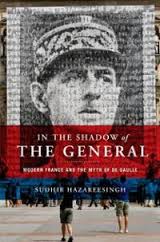
De Gaulle’s lasting influence: A Q&A with Dr Sudhir Hazareesingh
Sudhir Hazareesingh talks to Gavin Jacobson about his recent book, In the Shadow of the General: Modern France and the Myth of de Gaulle (New York, Oxford University Press, 2012).
Gavin Jacobson (GJ): Perhaps you could begin by telling us about what led you to start thinking more closely about Charles de Gaulle, and why you decided to write this book.
Sudhir Hazareesingh (SH): When I was finishing my book on the Napoleonic legend, I concluded that since the 1980s, General de Gaulle had become France’s favourite national hero. I found this intriguing, especially as de Gaulle seemed to have been adopted by the Left, who had opposed him vigorously for much of his time as president. So I thought it would be interesting to explore how and why this situation had come about – and also how this Gaullist cult compared with its Napoleonic predecessor. So this is what the book eventually became: a study of what de Gaulle has come to mean to the French, and what his iconic status tells us about French political culture.
GJ: Could you give us some idea of what you mean by ‘myth’? How is your understanding of it here different from the way people like George Sorel have previously defined it, for instance?
SH: I use ‘myth’ to denote an idealized representation of a phenomenon, either by a collectivity as a whole, or within a specific ideological framework – it can refer to a historical moment, like the French Revolution; certain moral and political values (‘we are a freedom-loving people’); exemplary social groups like the bourgeoisie or the proletariat; or leaders like Napoleon or de Gaulle. Sorel’s notion is more normative, and also more narrowly focused, in the sense that he is talking about how certain political ideals can help collective mobilizations to bring about revolutionary change. I think of myths as a much broader category, and they are not just about transformation: a powerful myth can also prevent substantial change (see the monarchy in Britain today!). I think myth is a useful concept for the social scientist because it opens up new avenues for analysis. Politics is too often thought about purely in ‘rational’ terms, as a function of interests – the concept of ‘myth’ is helpful to understand what role memory, imagination, and passion can also play in politics.










